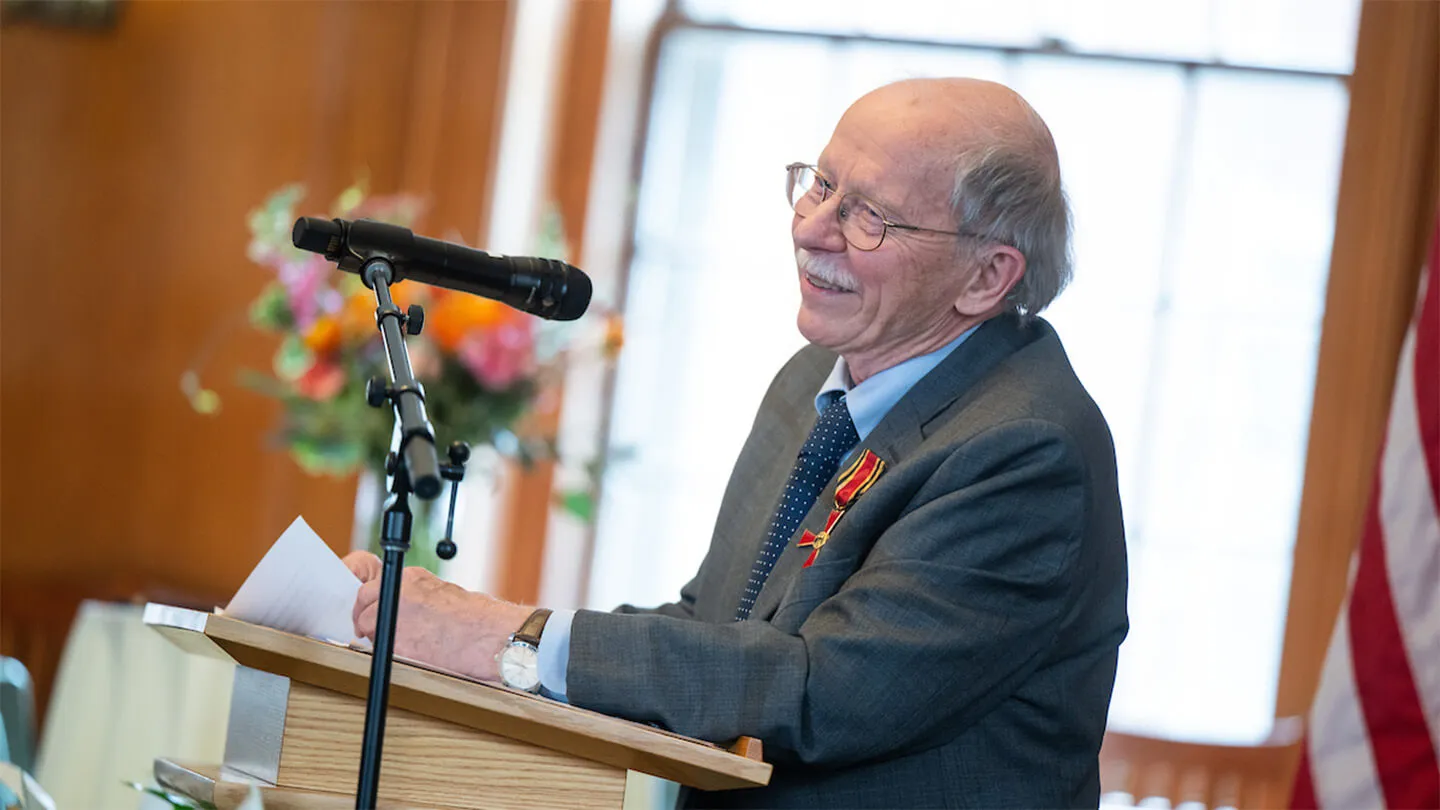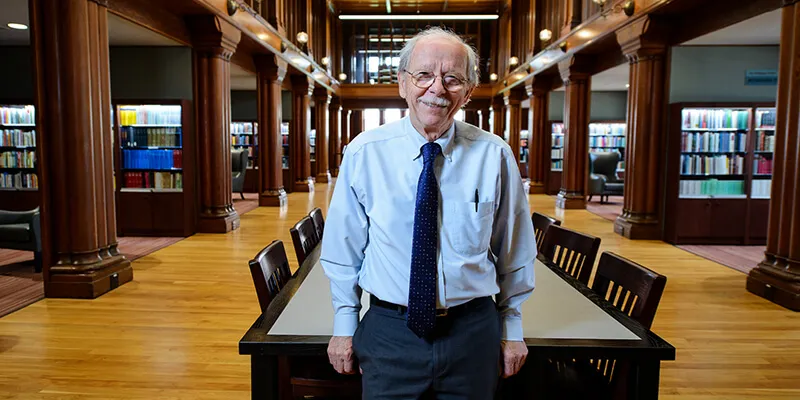When asked for his favorite success-related proverb, Wolfgang Mieder demurred. “I do not have one—I am not hung up on success. I’m just trying to do the best I can.”
His best is clearly exceptional. On April 3, 2025, Mieder, University Distinguished Professor of German and Folklore, Emeritus at the University of Vermont (UVM) and UVM Honorary Degree Recipient, was awarded the Order of Merit of the Federal Republic of Germany at a ceremony at UVM.
“It is my immense privilege to bestow the Order of Merit upon Professor Wolfgang Mieder in recognition of his extraordinary contributions to education, to the study of language, and to the friendship between our nations,” said Dr. Sonja Kreibich, Consul General of Germany to the New England states, who presented the award. “Through decades of work on proverbs and figures of speech, Professor Mieder has enriched our understanding of how language shapes thought, how wisdom is passed down through generations, and how cultures connect through shared expressions. He has given meaning to the idea that words are more than just words—they are windows into history, society, and the human spirit.”
The Order of Merit—Bundesverdienstkreuz der Bundesrepublik Deutschland in German—was established in 1951 and is the highest civilian honor awarded by the Federal Republic of Germany. It is given to recognize outstanding political, economic, social, and intellectual achievements, as well as exceptional social, charitable, and philanthropic work. For Mieder, it’s a recognition and celebration of his lifelong commitment to the study and teaching of Germany's cultural, literary, linguistic, and folk traditions.
“To get this recognition from my former homeland means a lot,” said Mieder. Born in Leipzig, Germany, he has lived in the United States since he was 16, and has received dozens of other honors and awards, including the Lifetime Scholarly Achievement Award from the American Folklore Society and the European Fairy Tale Prize. Having the Order of Merit added to that list “still blows me away,” he said. “It isn’t necessarily common that a professor gets this type of award, so it was quite unexpected.”
“This prestigious honor is a testament to Professor Mieder’s extraordinary contributions to the study and teaching of German culture, language, literature, and folklore,” said UVM Interim President Patricia Prelock. “His dedication over the past five decades has not only enriched UVM’s academic community but also fostered a deeper understanding and appreciation of Germany’s rich cultural heritage. We are immensely proud of his achievements and grateful for his enduring impact on our university and beyond.”
Mieder's career is a testament to longevity and dedication. He taught at UVM for 50 years, including 31 years as the chair of the former Department of German and Russian (now the Program in German, Russian, and Hebrew in the School of World Languages and Cultures), and retired in 2021. During his noteworthy career, he has written and edited over 200 books and over 500 articles in his primary areas of expertise: proverbs, fairy tales, and international folklore.
Those books alone show an astonishing breadth of scholarship, ranging from comprehensive compilations like The Dictionary of Modern Proverbs and The Prentice-Hall Encyclopedia of World Proverbs to collections with local appeal like Talk Less and Say More: Vermont Proverbs. He has written about the proverbial rhetoric of Charles Dickens, Frederick Douglass, Martin Luther King, Jr., Elizabeth Cady Stanton, Susan B. Anthony, Abraham Lincoln, Barack Obama, and Franklin Delano Roosevelt. He hasn’t shied away from challenging themes, either, with titles like The Politics of Proverbs: From Traditional Wisdom to Proverbial Stereotypes and“Right Makes Might”: Proverbs and the American Worldview.
Of course, Mieder has also written many books in his native German, such as Ein Schwert hält das andere in der Scheide, about the rhetoric of unified Germany’s first chancellor, Otto von Bismarck; Kleine Schritte sind besser als grosse Worte, analyzing the proverbial oratory of German politician and statesman Willy Brandt; and Sein oder Nichtsein, a book devoted to exploring the use of the “To be or not to be” quotation from Shakespeare’s Hamlet in literature, the media, and cartoons. (Never one to steal the spotlight, Mieder noted with pride that the first two books were co-authored by his friend and former student, Andreas Nolte M.A. ’03, who has since gone on to earn his Ph.D. in German.)
Many of Mieder’s books were published by UVM, as were the 38 volumes of proverb criticism he edited from 1984 to 2021 for an annual collection entitled Proverbium. (He now serves on the editorial board for the online publication.) His long-standing relationship with UVM has greatly enhanced the university's academic resources. In 2019, Mieder donated his personal collection of 9,000 books to UVM, leading to the establishment of the International Proverb Library in Billings Library.
“Proverbs matter. They’re insight and generalizations based on experiences and observations,” Mieder said. He noted that while proverbs are not universally true, they reflect human nature, perfections, problems, and stereotypes—and, because they are frequently repeated, illustrate the importance of being aware of the language we use. “The best tool we have is words and they open a lot of doors, but they can also close them,” he said.
One of Mieder’s favorite practices throughout his career has been to create festschriften, collections of their works, for his colleagues on the occasion of their 65 birthdays. In a wonderful example of the proverb “what goes around comes around,” Mieder himself has been the subject of six festschriften written as tributes to him by fellow scholars in the field.
When he’s not writing or editing, Mieder likes to bicycle, garden, chop wood, and snowshoe with Barbara, his wife of 56 years. And, of course, he loves to travel and frequently returns to Germany for conferences and meetings.
During his last few years teaching at UVM, Mieder taught a popular class called The Nature and Politics of Proverbs that used two of his own works— Proverbs: A Handbook and Proverbs Are Never Out of Season—as textbooks. “At the end of the course, I always sent the students on their way with my three favorite proverbs,” he recalled. They were “Different strokes for different folks,” “Making a way out of no way” (one frequently recited by Martin Luther King, Jr.), and “Do unto others as you would have them do unto you,” (aka the golden rule). “I would tell them that if they adhere to these and follow their wisdom, they will do okay in life and be good human beings,” Mieder said.
And that, we think, beautifully encapsulates the kind of wisdom and dedication that have earned him the Order of Merit.

